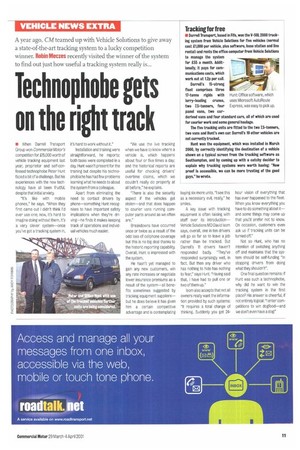Technophobe gets on the right track
Page 13

If you've noticed an error in this article please click here to report it so we can fix it.
• When Darrell Transport Group won Commercial Motor's competition for £15,000 worth of vehicle tracking equipment last year, proprietor and self-confessed technophobe Peter Hunt faced a bit of a challenge. But his experiences with the new technology have all been fruitful, despite that initial anxiety.
"It's like with mobile phones," he says. "When they first came out I didn't think I'd ever use one; now, it's hard to imagine doing without them. It's a very clever system—once you've got a tracking system in, it's hard to work without it."
Installation and training were straightforward, he reports; both tasks were completed in a day. Hunt wasn't present for the training but despite his technophobia he has had few problems learning what he needs to about the system from a colleague.
Apart from eliminating the need to contact drivers by phone—something Hunt recognises to have important safety implications when they're driving—he finds it makes keeping track of operations and individual vehicles much easier. We use the live tracking when we have to know where a vehicle is, which happens about four or five times a day; and the historical reports are useful for checking drivers' overtime claims, which we couldn't really do properly at all before," he explains.
"There is also the security aspect if the vehicles get stolen—and that does happen to courier vans running computer parts around as we often are," Breakdowns have occurred once or twice as a result of the odd loss of cellphone coverage but this is no big deal thanks to the historic reporting capability. Overall, Hunt is impressed with the system.
He hasn't yet managed to gain any new customers, win any rate increases or negotiate lower insurance premiums as a result of the system—all benefits sometimes suggested by tracking equipment suppliers— but he does believe it has given him a certain competitive advantage and is contemplating buying six more units. "I see this as a necessary evil, really," he smiles.
A key issue with tracking equipment is often liaising with staff over its introduction— Vehicle Solutions MD David Isom says, overall, one in ten drivers will go as far as to leave a job rather than be tracked. But Darrell's 11 drivers haven't responded badly. "They've responded surprisingly well, in fact. But then any driver who has nothing to hide has nothing to fear," says Hunt. "Having said that, I have had to pull one or two of them up."
Isom also accepts that not all owners really want the information provided by such systems: "It requires a total change of thinking. Suddenly you get 24 hour vision of everything that has ever happened to the fleet. When you know everything you have to do something about it— and some things may come up that you'd prefer not to know. On occasion, customers even ask us if tracking units can be turned off."
Not so Hunt, who has no intention of switching anything off and maintains that the system should be self-funding "in stopping drivers from doing what they shouldn't".
Ore final question remains: if Hunt was such a technophobe, why did he want to win the tracking system in the first place? His answer is cheerful, if not entirely logical: "I enter competitions to win dogfood—and we don't even have a dogi"








































































































